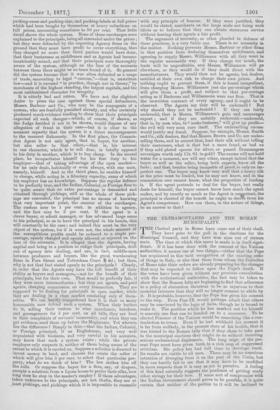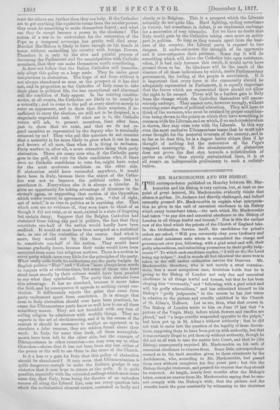THE ULTRAMONTANES AND THE ROMAN MUNICIPALITY.
THE Clerical party in Rome have come out of their shell. They have gone to the poll in the elections for the Municipal Council, and they have won nine out of sixteen seats. The time at which this move is made is in itself signi- ficant. If it has been done with the consent of the Vatican authorities, it means-one of two things,—either that the Pope has acquiesced in this tacit recognition of the existing order of things in Italy, or else that those from whom the Catholics of Rome take their orders are already preparing for the changes that may be expected to follow• upon the Pope's death. If the votes have been given without any previous consultation with the ecclesiastical authorities, the fact may be taken to show that the Roman laity are beginning to find that adherence to a policy of abstention threatens to be so injurious to their material interests that they will no longer consent to abide by it. It is probable, however, that the Pope has given his consent to the step. Even Pius IX. would perhaps admit that others may be convinced by the logic of facts, though he is bound to resist it. The position which he has marked out for himself is scarcely one that can be handed on to a successor. To be elected Prisoner of the Vatican would be something like a con- tradiction in terms. Even if he had withheld his consent it is far from unlikely, in the present state of his health, that it was hinted to the Roman laity that if they chose to take part in the municipal elections they might do so without incurring serious ecclesiastical displeasure. The long reign of the pre- sent Pope must have given birth to a rich crop of suppressed criticism. His policy has had full time to develope itself. Its results are visible to all men. There may be no conscious intention of diverging from it on the part of the Curia, but they can hardly fail to see that it may have to be modified in more respects than it is easy as yet to perceive. A feeling of this kind naturally suggests the prudence of getting ready other strings for their bow. If some sort of compromise with the Italian Government should prove to be possible, it is quite certain that neither of the parties to it will be inclined to
trust the others any further than they can help. If the Catholics are to get anything like equitable terms from the secular power, they must do something to make themselves feared ; and what can they do except become a power in the elections ? The notion of a war to be undertaken for the restoration of the Pope as a temporal sovereign has pretty well died away. Marshal Macliahon is likely to have enough on his hands at home without embroiling his country with foreign Powers. Therefore it is only by the slow and painful process of leavening the Parliament and the municipalities with Catholic members, that they can make themselves worth conciliating.
It does not follow that the Italian Catholics will immedia- tely adopt this policy on a large scale. They lie under great temptations to abstention. The hope of aid from without is not always abandoned as soon as the prospect of it has died out, and in proportion as the Catholics of Italy come to take their place in political life, the less exceptional and abnormal will the condition of Italy appear. In the existing constitu- encies, at all events, the Catholics are likely to be usually in a minority ; and to come to the poll at every election merely to enter an appearance, and to show that their numbers, if in- sufficient to carry the election, are still not to be despised, is a singularly ungrateful task. Of what use is it, the Catholic voters will ask, to present ourselves, time after time, just to show that we exist, and that we do not re- gard ourselves as represented by the deputy who is nominally returned by us They who put this question do not consider that a minority is far more likely to grow when it can be seen and known of all men, than when it is living in seclusion. Party warfare is, after all, a more attractive thing than party abstention. There are many men who, if the Catholic party goes to the poll, will vote for their candidates who, if there were no Catholic candidates to vote for, might have voted
• for the most moderate candidate on the other side. If abstention could have succeeded anywhere, it would have been in Italy, because there the object of the Catho- lics was not to improve the political order, but to overthrow it. Everywhere else it is always a blunder. It gives no opportunity for taking advantage of divisions in the enemy's cimp, or supporting that section of the Opposition which comes nearest to agreement with you. "Out of sight, opt of mind," is as true in politics as in anything else. That which men see no evidence of, they soon learn to think of as though it did not exist, or at most, existed in a state of lingering but certain decay. Suppose that the Belgian Catholics had abstained from taking any part in politics, the fact that they constitute one-half of the nation would hardly have been credited. It would at most have been accepted as a statistical fact, as one of the curiosities of the census. And what is more, they would not by this time have continued to constitute one-half of the nation. They would have become gradually fewer, because their ranks would have been recruited from none but religious motives. There is a section in every party which cares very little for the principles of the party. What really calls forth its enthusiasm are the party badges. In English politics "Blue" and "Yellow " have always been words to conjure with at election-time, but some of those who have stead most stoutly by their colours would have been puzzled to say what they symbolised. The party that abstains loses this advantage. It has no standard, because it never takes the field, and by consequence it appeals to nothing except con- viction. It deliberately rejects the gains that come from party excitement apart from conviction. It is strange that even in Italy abstention should over have been practised, be- cause the Ultramontane party know so well how to use all these subsidiary means. They are not troubled with any fear of soiling religion by admixture with worldly things. They are experts in the art of electioneering, and if in the course of the contest it should be necessary to malign an opponent or to circulate a false rumour, they are seldom found above their work. In Italy, for some time back, all these accomplish- ments have been left to the other side, but the example of Ultramontanes in other countries—we may even say in other Churches—shows that it has not been from any loss either of the power or the will to use them in the cause of the Church.
Is it a loss or a gain for Italy that this policy of abstention should be abandoned ? It may seem that Ultramontanism is quite dangerous enough to make the Italians grudge it any victories that it may hope to obtain at the polls. It is quite possible, especially with the extended suffrage which must come some day, that Italy, from being the theatre of an unbroken success all along the Liberal lino, may see every question into which the ecclesiastical element enters, contested as hotly and closely as in Belgium. This is a prospect which the Liberals naturally do not quite like. Hard fighting, ending sometimes in victory, but sometimes in defeat, is an unpleasant exchange for a succession of easy triumphs. Yet we have no doubt that Italy would gain by the Catholics taking once more an active part in politics. So long as they remain apart from the busi- ness of the country, the Liberal party is exposed to two dangers. It under-estimates the strength of its opponents and it over-estimates their patience. Some day it will do something which will drive the Catholics into open resistance, when, if it had only foreseen this result, it would never have pressed them so far. Its blindness will be the result of the absence of all those indications by which, under Parliamentary government, the fooling of the people is ascertained. If it is important that every force in the community should be adequately represented in Parliament, it is equally important that the forces which are represented there should not allow the right to lie unused. There will be a further gain to Italy from the change which the Catholics themselves will uncon- sciously undergo. They cannot vote, however wrongly, without receiving some degree of political education. They will have to think of the waverers, who must be retained by proper considera- tion being shown to the points on which they have something in common with the Liberals, and on which, if no such consideration is shown, they may even vote with the Liberals. In this way even the most exclusive Ultramontane learns that he must take some thought for the material interests of the country, and in so far as he does this, he is a degree better citizen than if be thought of nothing but the restoration of the Pope's temporal sovereignty. If the abandonment of abstention does not prove the first step towards a redistribution of parties on other than strictly ecclesiastical lines, it is rd. all events an indispensable preliminary to such a redistri- bution.







































 Previous page
Previous page